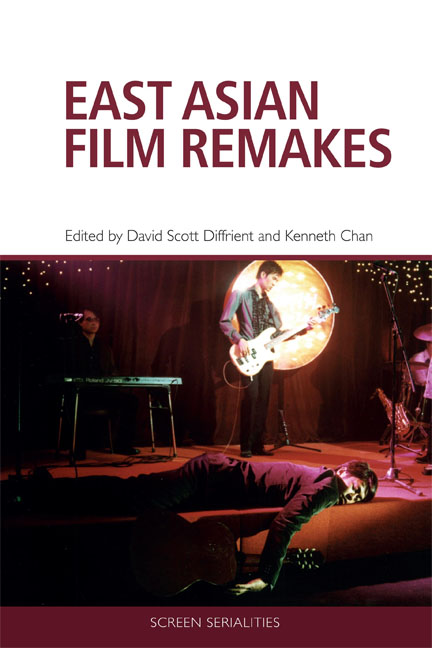Book contents
- Frontmatter
- Contents
- List of Illustrations
- Foreword
- Notes on Contributors
- Introduction: East Asian Film Remakes
- Part I Re-fleshing the Text: Sex, Seduction, Desire
- Part II Serialising Ozu: The Enduring Legacy of a Cinematic ‘Tofu Maker’
- Part III Revisiting Personal/Political Traumas in East Asian Action Films, Gangster Films and Westerns
- Part IV Local Flavours and Transcultural Flows in East Asian Comedies, Dramas and Fantasies
- Index
Introduction: East Asian Film Remakes
Published online by Cambridge University Press: 01 March 2025
- Frontmatter
- Contents
- List of Illustrations
- Foreword
- Notes on Contributors
- Introduction: East Asian Film Remakes
- Part I Re-fleshing the Text: Sex, Seduction, Desire
- Part II Serialising Ozu: The Enduring Legacy of a Cinematic ‘Tofu Maker’
- Part III Revisiting Personal/Political Traumas in East Asian Action Films, Gangster Films and Westerns
- Part IV Local Flavours and Transcultural Flows in East Asian Comedies, Dramas and Fantasies
- Index
Summary
Over the past three decades, the subject of cinematic remakes has emerged as a major subdiscipline in film studies, giving rise to a host of critical, philosophical and theoretical approaches that highlight the historical significance of iterative storytelling within and across different national contexts. Thanks to the ongoing efforts of Daniel Herbert, Thomas Leitch, Kathleen Loock, Lucy Mazdon, Claire Perkins, Constantine Verevis and several other scholars who are drawn to the remake's contradictory appeals and intertextual complexities, this long-disparaged category of filmmaking – once brushed off by critics as little more than a derivative copy or pale imitation of an original text – is now recognised as a legitimate cultural form in its own right, one that aesthetically reframes the distant or recent past while providing a paradoxically nostalgic vantage on modern-day issues. Indeed, with so many published studies of remakes currently available, it would seem that very little remains to be said about a topic that is already brimming with taxonomies and terminology unique to this most bankable and pervasive type of cultural production.
Despite a proliferation of books and articles about remakes, however, a regional survey of representative films produced in East Asia is only just now – with this publication – coming to fruition. This volume seeks to fill a significant gap in the history of remakes by bringing together original contributions from experts in Chinese, Hong Kong, Japanese, South Korean and Taiwanese cinemas, thereby providing fresh perspectives on a subject that has largely been confined to North American and European contexts. It builds upon a few important publications, including Yiman Wang's Remaking Chinese Cinema: Through the Prism of Shanghai, Hong Kong and Hollywood (2013) and Sarah Woodland's Remaking Gender and the Family: Perspectives on Contemporary Chinese-Language Film Remakes (2018), which have been instrumental in securing a place for what Wang refers to as ‘peripheral and subaltern’ remakes in US, British and other academic arenas where Sinophone studies now sits comfortably alongside film studies. However, as an edited collection of fifteen chapters (including a roundtable discussion about the pan-Asian ‘Miss Granny’ phenomenon that began in 2014 with the Korean-language Suspicious Girl [Susanghan geunyeo] and has so far resulted in seven remakes across East and Southeast Asia), this book does not focus exclusively on any one nation's cinematic output.
- Type
- Chapter
- Information
- East Asian Film Remakes , pp. 1 - 24Publisher: Edinburgh University PressPrint publication year: 2023

